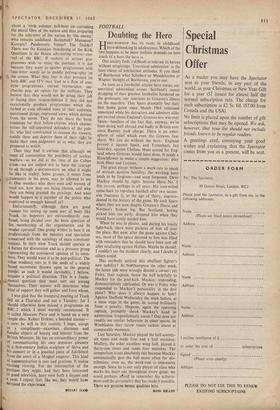FOOTBALL
Doubting the Hero
HERO-WORSHIP has its roots in childhood, hero-debunking in adolescence. Which of the two happens to be more realistic depends on how much of a hero the hero is.
Our. society finds it difficult to tolerate its heroes without misgivings. 'Uncritical admiration' is the least classy of intellectual attitudes. If you think of Beethoven what Schubert or Mendelssohn or Wagner thought of Beethoven, you're out.
As soon as a footballer attains hero status, our uncritical admiration ceases. Scotland's recent dropping of their greatest footballer bordered on the grotesque. our reactions to Greaves's illness on the macabre. That Spurs promptly lost their first home gaine since March 1964 remained unnoticed while his detractors and admirers alike got excited about England's Greaves-less win over Spain—heedless of the fact that, anyway, we've been doing well abroad and badly in Britain ever since Ramsey took charge. There is an atmo- sphere of relief which even the Greaves fans share. We can do without the hero : England proved it against Spain, and Tottenham, last Saturday, against Chelsea. Hunt scored for Eng- land where Greaves would have done. It needs a Blanchflower to make a simple suggestion : play both Hunt and Greaves.
The great player without a work-rate to speak of arouses positive hostility; .the working hero tends to be forgiven—and soon forgotten. Dave Mackay should by rights become Hero No. 1 this season, perhaps in all sport. His iron-willed come-back to top-class football after two succes- sive fractures is, at the age of thirty, unprece- dented in the history of the game. He took Spurs where they are now despite Greaves's illness and Norman's broken leg. But Scotland, having picked him too early, dropped him when they would have sorely needed him.
When he was in plaster, and during his lonely fight-back, there were pictures of him all over the place. But now, after the game against Chel- sea, most of the space devoted to him was filled with reminders that he should have been sent off after retaliating against Hollins. Maybe he should; I couldn't see the incident clearly, and I doubt if others could.
Has anybody noticed this ebullient fighter's new nobility? At Northampton the other week, the home side were wrongly denied a corner; yet Foley, their captain, threw the ball helpfully to Mackay for the goal-kick. Mackay, responding, demonstratively applauded. Or was it Foley who responded to Mackay's personality in the first place? Why does it always happen to him? Against Sheffield Wednesday the week before, at a tense stage in the game, he scored brilliantly from a penalty. Megsom, again the opposing captain, promptly shook Mackay's hand in admiration. Ungentlemanly soccer? One does not readily see similar behaviour in other sports. In Wimbledon they throw tennis rackets about at comparable moments.
Last Saturday, Mackay played the ballseventy- six times and made four and a half mistakes; Mullery, the other excellent wing half, played it thirty-one times and made four mistakes. The comparison is not absolutely fair because Mackay automatically gets the ball more often for dis- tribution; even so, the work-rate is impressive enough. Since he is our only player of class who works his heart out throughout every game, we could perhaps afford to remember his achieve- ment and the personality that has made it possible. There are genuine heroic qualities here.
HANS KELLER






























 Previous page
Previous page